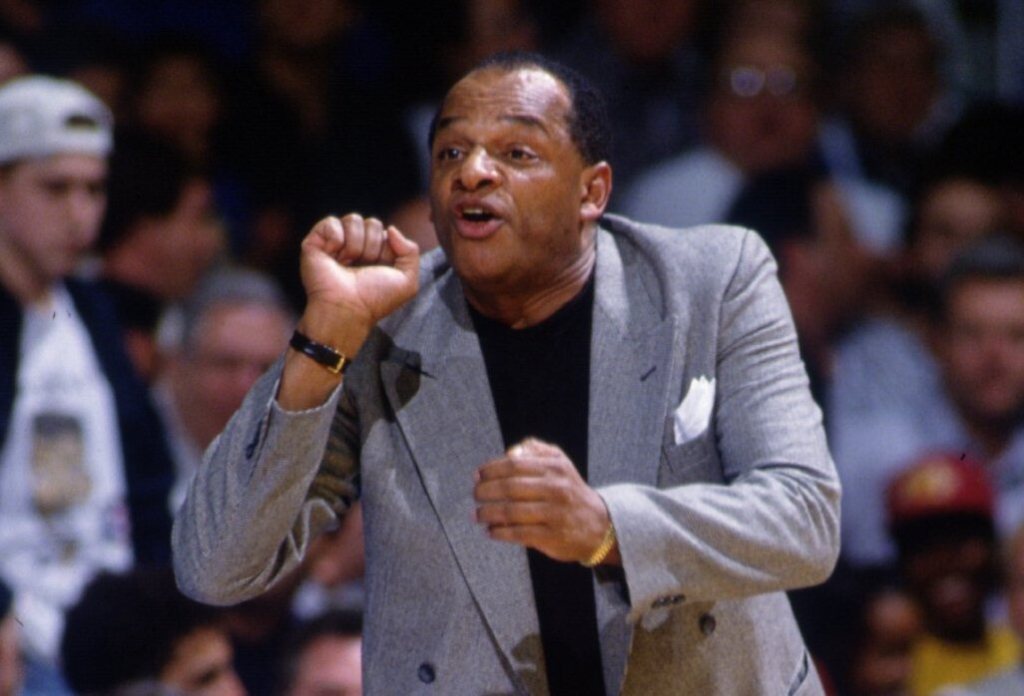
Former USC and NBA player Duane Cooper knew George Raveling by many names. Sometimes Coach, sometimes Rav, sometimes Dad.
“He was one of the first guys to ever tell me he loved me as a man,” said Cooper, who grew up in a single-parent household. “And every time we got on the phone, he would tell me he loves me and I would tell him the same thing.”
That’s how the two ended their final phone call roughly a month ago. Raveling didn’t mention the cancer, which claimed his life on Monday. That was typical of the larger-than-life basketball figure – putting the needs of others before himself.
“That would just be par for the course,” Cooper said, “because he just wanted to help people.”
Cooper was on Raveling’s 1992 USC team that lost on a desperation 3-pointer at the final buzzer in the second round of the NCAA Tournament and achieved an eighth-place finish in the final AP Top 25 poll. Harold Miner, the Trojans’ all-time leading scorer, was the team’s star.
Cooper can rattle off every player on that roster and what their value was. He was in his final year at USC before being drafted to the Lakers, and he was someone Raveling confided in to tap into the pulse of the team. So much so that one players started calling him “uncle.”
“He was a great delegator,” Cooper said. “But he was just the orchestrator. He was in the front with the tux, giving everyone instruction. But he also took our opinions and he would always ask me, what do you think is going to work right now? As much as he was the conductor, he was also a great listener and so to me, that is what made him great.”
The former Trojan guard channels Raveling in his current role as head coach at Lakewood High School, and current USC men’s basketball coach Eric Musselman has taken cues, too.
Musselman is an avid reader of The Daily Coach, an online publication and newsletter that was co-founded by Raveling. Some recent headlines from the site include “No One Wins Alone” and “What a Lion Named Scarface Can Teach Us About Resilience.”
“Just his wisdom. I think that a lot of coaches have always looked up to him,” Musselman told reporters on Wednesday. “He took jobs that he just did an incredible job from a basketball standpoint that might not have been easy jobs at the time when he had them.”
Raveling broke barriers as the first Black coach in the Pac-8 as well as the ACC and was a bodyguard at Martin Luther King Jr.’s March on Washington in 1963. He was given the original copy of the “I Have a Dream” speech on that day.
The coach remained humble, Cooper recalled.
“Sometimes as a leader, you can’t always talk about what you do – you’ve got to be about it. He was about it,” he said. “He led by example. And I think that’s part of the reason why he was a great recruiter. He embodied everything all the parents would want from their child.”
Raveling brought in seven new players in his first season as head coach at USC in 1987, including Calvin Banks, Ronnie Coleman, Robert Hooper, Chris Moore, Andy Olivarez, Johnny Holmes and Cooper.
His ability to bring people together while emphasizing individual value melded the group, and made a lasting impression on Cooper.
“He would always say, ‘Be who it is that you are,’” he said. “You can’t be someone else. You can implement some of the things that someone else might implement, but you have to be yourself.”
Originally Published:



